EDUCATION
| Publication Cover | Title |
|---|---|
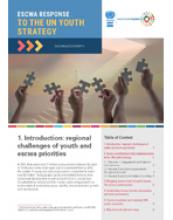 |
ESCWA response to the UN Youth Strategy, Social Development Bulletin, Vol 7, No. 2 E/ESCWA/SDD/2019/TP.2 Young people under 30 represent 60% of the total population of the Arab region today. The number of youth aged 15 to 24 is expected to increase from 71 million in 2015 to 92 million in 2030. This... |
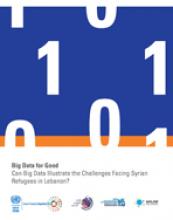 |
Big Data for Good: Can Big Data Illustrate the Challenges Facing Syrian Refugees in Lebanon? E/ESCWA/CL6.GCP/2020/TP.7 Non-traditional data sources ought to be considered for supporting policymaking. In addition to official statistics or traditional data sources, the non-traditional data used in this project are... |
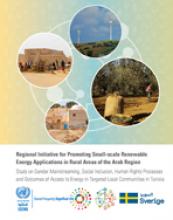 |
Study on Gender Mainstreaming, Social Inclusion, Human Rights Processes and Outcomes of Access to Energy in Targeted Local Communities in Tunisia E/ESCWA/CL1.CCS/2020/TP.6 This report was developed within the REGEND (Regional Initiative for Promoting Small-Scale Renewable Energy Applications in Rural Areas of the Arab Region) framework with an assessment to guide... |
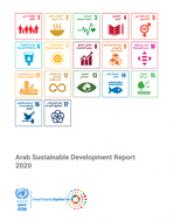 |
Arab Sustainable Development Report 2020 E/ESCWA/SDD/2019/2 Achieving sustainable development in the Arab region faces structural barriers that are often shared among the 22 Arab countries, despite variations in income level, natural resources, and... |
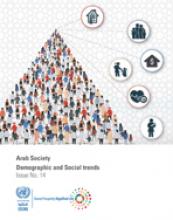 |
Arab Society: Demographic and Social trends Issue No. 14 E/ESCWA/SD/2019/5 Arab Society: A Compendium of Demographic and Social Statistics, Issue No. 14 is the latest in a series of biennial compendia of the Statistics Division of the Economic and Social Commission... |
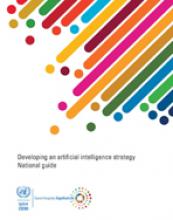 |
Developing an artificial intelligence strategy: National guide E/ESCWA/CL4.SIT/2020/TP.8 Components supporting successful AI strategies from around the world: |
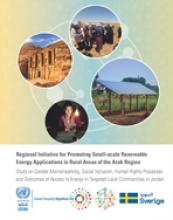 |
Study on Gender Mainstreaming, Social Inclusion, Human Rights Processes and Outcomes of Access to Energy in Targeted Local Communities in Jordan E/ESCWA/CL1.CCS/2020/TP.4 This report was developed within the REGEND (Regional Initiative for Promoting Small-Scale Renewable Energy Applications in Rural Areas of the Arab Region) framework with an assessment to guide... |
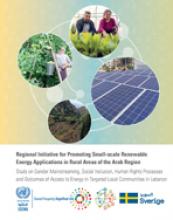 |
Study on Gender Mainstreaming, Social Inclusion, Human Rights Processes and Outcomes of Access to Energy in Targeted Local Communities in Lebanon E/ESCWA/CL1.CCS/2020/TP.3 This report was developed within the REGEND (Regional Initiative for Promoting Small-Scale Renewable Energy Applications in Rural Areas of the Arab Region) framework with an assessment to guide... |
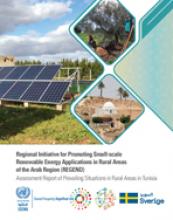 |
Assessment Report of Prevailing Situations in Rural Areas in Tunisia E/ESCWA/CL1.CCS/2020/TP.2 The baseline study for Tunisia was developed within the Regional Initiative for Promoting Small-Scale Renewable Energy Applications in Rural Areas of the Arab Region (REGEND) framework with an... |
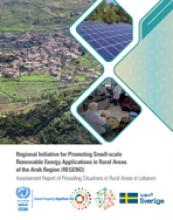 |
Assessment Report of Prevailing Situations in Rural Areas in Lebanon E/ESCWA/CL1.CCS/2020/TP.1 The baseline study for Lebanon was developed within the REGEND (Regional Initiative for Promoting Small-Scale Renewable Energy Applications in Rural Areas of the Arab Region) framework with an... |
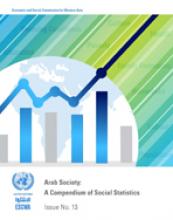 |
Arab Society: A Compendium of Demographic and Social Statistics, No. 13 E/ESCWA/SD/2017/5 Arab Society: A Compendium of Social Statistics, Issue No. 13 is the latest in a series of biennial compendiums of the Statistics Division of the Economic and Social Commission for Western Asia... |
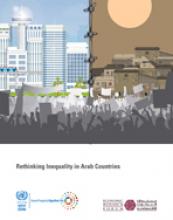 |
Rethinking Inequality in Arab Countries E/ESCWA/EDID/2019/2 The Rethinking Inequality in Arab States report fills knowledge gaps about inequality in the Arab region, using a multidimensional approach that focuses on non-income dimensions: Health,... |
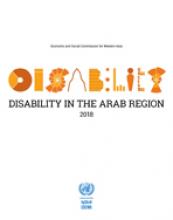 |
Disability in the Arab Region 2018 E/ESCWA/SDD/2018/1 This report presents and analyses statistics relating to the demographic characteristics and socio-economic situation of persons with disabilities in the Arab region. It is based on data from... |
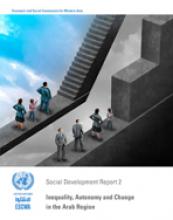 |
Social Development Report 2: Inequality, Autonomy and Change in the Arab Region E/ESCWA/SDD/2017/6 This report examines how inequality and personal autonomy are likely to impact on the broad “political settlement “in the Arab region overtime. Chapter one provides a historical overview of the... |
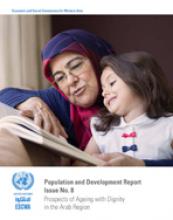 |
Population and Development Report Issue No. 8: Prospects of Ageing with Dignity in the Arab Region E/ESCWA/SDD/2017/3 The number and share of older persons in the Arab region are steadily growing and will increase substantially in the following decades. The advent of this ageing transition, which most Arab... |
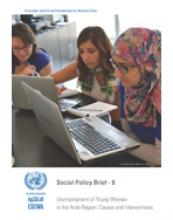 |
Unemployment of Young Women in the Arab Region: Causes and Interventions, Social Policy Brief, No. 8 E/ESCWA/SDD/2015/Brief.8 This policy brief unveils the underlying causes and consequences of young women’s unemployment in the region and warns that the inability of young women to reach into the labour market, would... |
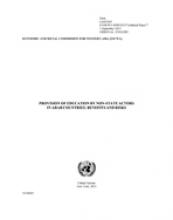 |
Provision of Education by Non-State Actors in Arab Countries: Benefits and Risks E/ESCWA/SDD/2015/Technical Paper.7 Education represents a basic human right and a major priority for Arab Governments. Over recent years, the Arab region has witnessed a substantial increase in enrolment rates and one of the... |
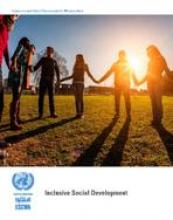 |
Inclusive Social Development E/ESCWA/SDD/2015/2 |
 |
Social development bulletin No. 3: The post-2015 UN development agenda E/ESCWA/SDD/2013/Technical Paper.3 This bulletin explains the content of a report entitled “Realizing the Future We Want for All” that sets out a vision for the future based on the core values of human rights, equality and... |
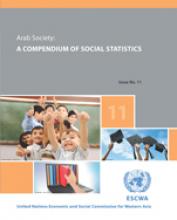 |
Arab Society: A compendium of Social Statistics, No. 11 E/ESCWA/SD/2013/13 Arab Society: A Compendium of Social Statistics is the latest in a series of biennial compendia of the Statistics Division of the Economic and Social Commission for Western Asia (ESCWA). ... |





